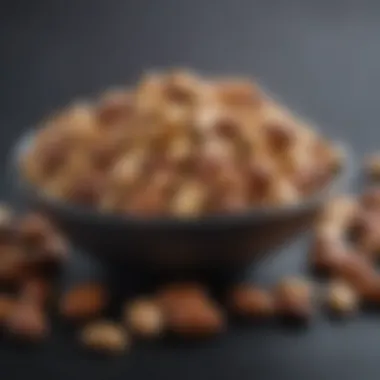Smart Choices for Healthy Late-Night Snacks


Intro
Late-night snacking can sometimes feel like a guilty pleasure, but it doesn’t have to be! The choices we make in those twilight hours can significantly influence not only our sleep but also our overall health. In a world that's continually buzzing with activity, the temptation to reach for a quick bite before bed is all too common. However, putting thought into what you munch on at night can create a lasting impact on your health and well-being.
Healthy late-night snacks are more important than many realize. When the clock strikes ten, you might be aiming for something to satiate your hunger without derailing your wellness goals. This article goes deep into the realm of nighttime nibbles that are not just tasty but also nutritious.
We will explore different types of snacks that cater to various dietary needs, whether you’re vegan, gluten-free, or simply looking to cut down on sugars. Each suggestion comes with its own set of nutritional benefits that could contribute to restful sleep and energetic mornings.
It can be daunting to sift through the multitude of options available today, so this guide is designed to provide clarity. You’ll find insights into what makes a snack healthy, how certain foods can affect your sleeping patterns, and practical tips for preparing items that are ready to go when cravings strike.
As we navigate through this guide, keep in mind your personal lifestyle and preferences. Finding the perfect late-night treat goes beyond mere calorie count—it's about nourishing your body while censoring those pesky munchies that can come knocking as you wind down. Let's dig in!
Understanding Late-Night Eating
Eating late at night often brings a sense of comfort but can also pose challenges for those who are conscious about their health and wellness. This section explores the reasons behind late-night munching and why it’s critical to make informed choices to ensure it supports overall well-being.
Many people find themselves reaching for snacks in the wee hours. The allure of a midnight snack can stem from a multitude of factors, both psychological and physiological. Understanding these can help in making better food choices that not only satisfy hunger but also align with one’s health goals.
The importance of understanding late-night eating lies in its dual nature: it can be both a source of pleasure and a potential pitfall if careless choices are made. Late-night eating habits can significantly impact sleep and metabolic processes, and thus, it’s essential to recognize how different types of snacks can either promote a restful night or disrupt it.
The first step toward healthier night snacking is to uncover the psychology behind those cravings.
The Psychology of Midnight Cravings
Midnight cravings often reveal deeper mental processes at play. After a long day, many people find solace in food, using it as a means of unwinding. This emotional component drives our late-night snack decisions. If you’ve ever scrounged through the kitchen after a hectic day at work, you’re not alone; emotional connections to food are widespread.
Consider the following:
- Stress Relief: Some individuals turn to snacks that evoke warm memories or comfort, like cookies or ice cream. This behavior can form a cycle, where food is tied to stress relief, leading to habitual late-night eating.
- Social Influence: Watching movies or hanging out with friends can alter perceptions about eating at night. When we see our peers indulging, we might feel compelled to join in.
- Biological Rhythms: The body’s internal clock can also influence cravings. For instance, as the night progresses, hormones like ghrelin can spike, making us feel hungrier and prompting us to snack.
"Understanding and addressing the triggers behind midnight snacking can pave the way for healthier habits without sacrificing the joy of enjoying food."
Physiological Responses to Late-Night Snacks
Our body responses to nightly snacking can be more profound than many realize. At night, our metabolism operates differently than during the day, which means that what's healthy in the morning might not be ideal at night.
Here are some key physiological aspects to consider:
- Metabolic Rate: Studies show that our metabolism slows as darkness falls. Late-night snacking—especially heavier foods—can lead to weight gain because the body is less efficient at utilizing those calories.
- Digestive Function: Eating too close to bedtime can interfere with digestion, leading to discomfort and disrupted sleep. Foods high in fat or spice are often the culprits here, intensifying the chances of indigestion.
- Hormonal Fluctuations: Nighttime eating can trigger hormonal responses that impact sleep quality. Insulin levels, for instance, can spike in response to carbohydrate-rich snacks, which may disrupt sleep patterns.
By understanding these physiological reactions, one can make thoughtful decisions about what to eat when those cravings hit. Opting for lighter, nutrient-dense snacks instead of calorie-laden comfort items can promote a balanced night’s sleep.
In summary, recognizing the psychological and physiological factors at play in late-night eating can help guide smarter choices that benefit both mind and body. Next, we’ll examine how our snack choices directly impact sleep quality.
Nutritional Impacts of Nighttime Snacking
Understanding the nutritional implications of late-night snacking is vital for anyone interested in promoting better health and sleep quality. Late-night indulgence often comes with the danger of making poor food choices, usually driven more by cravings than genuine hunger. Examining our choices and their subsequent effects can make a world of difference in our physical well-being and sleep pattern.
How Food Choices Affect Sleep Quality
One important aspect to consider is that not all snacks will impact sleep the same way. Consuming higher amounts of sugar or unhealthy fats can lead to spikes in our blood sugar levels, which in turn disrupt our natural sleep cycles. A sugar-laden snack like chocolate cake might satisfy a sweet tooth momentarily but could keep one tossing and turning all night. In contrast, foods rich in tryptophan, such as turkey or dairy products, might help induce sleep due to their positive influence on serotonin production.
- Complex carbs: These can help the body utilize tryptophan more effectively. Think of whole-grain cereals or oatmeal as nighttime allies.
- Avoid caffeine: It’s wise to steer clear of snacks with caffeine content, like chocolate or caffeinated teas, if sleep is the goal.
- Moderate portions: Eating substantial amounts might weigh heavily on your digestion, further hampering your ability to rest.
"The right snack can be a power-up; the wrong one can turn restful moments into restlessness."
Balancing Macronutrients for a Healthy Snack


When creating a late-night snack, aim for a well-rounded balance of macronutrients. This means integrating carbohydrates, proteins, and fats into the mix. Each plays its part in ensuring that the food we eat benefits us rather than hinders our night’s rest.
- Carbohydrates: Opt for whole-grain options that provide fiber, which can help control hunger while also supporting digestive health. Fiber from sources like whole-grain toast or oats not only fills you up but helps regulate blood sugar levels.
- Proteins: Incorporating lean proteins, such as Greek yogurt or cottage cheese, can provide a sense of fullness and also support muscle repair during the night.
- Fats: Healthy fats, like those found in avocados or nuts, are essential for brain health. They can slow down digestion, ensuring a lasting sense of satiety without overdoing it.
Choosing the Right Ingredients
Eating at night isn’t just about satisfying cravings; it’s a delicate dance of making choices that can impact your overall health and well-being. Choosing the right ingredients for late-night snacks can be a game changer, ensuring that you fuel your body with what it needs rather than empty calories that might disrupt sleep or lead to unwanted weight gain. Here, we will explore various healthy components that not only taste good but also leave you feeling satisfied and refreshed.
Whole Grains for Sustained Energy
Whole grains are champions of satiety and sustained energy. Unlike their refined counterparts, whole grains maintain their fiber and nutrient content, which can help stabilize blood sugar levels throughout the night. This means you can avoid those infamous midnight sugar crashes that leave you rummaging through the pantry for more snacks.
Consider opting for whole-grain options such as brown rice cakes, quinoa crackers, or high-fiber cereal mixed into yogurt. They keep you feeling full longer and can even help support digestion, making for a peaceful night’s sleep.
Lean Proteins that Promote Satiety
Lean proteins can be a nighttime ally, especially for those who find themselves feeling hungry at odd hours. Foods rich in protein generally take longer to digest, which means they help keep hunger at bay. Think of options like turkey slices, cottage cheese, or even boiled eggs. These kinds of snacks provide the amino acids your body craves and can aid in muscle repair, especially if you’ve had an active day.
Adding a sprinkle of seasoning or a dash of hot sauce can turn a plain piece of chicken or tofu into a tantalizing treat that keeps cravings in check.
Healthy Fats to Nourish the Body
Not all fats are created equal, and incorporating healthy fats into your late-night snacking can be a wise move. Foods like avocados, nuts, and seeds not only offer rich flavors but also essential nutrients that can aid in relaxation and encourage a good night’s sleep. They’re packed with omega-3 fatty acids that support heart health.
When you reach for healthy fats, try spreading some almond butter on whole-grain toast or enjoying a few olives with your vegetable sticks. These goodies help balance your snacks, keeping you full and satisfied without reaching for unhealthy options.
Fruits and Vegetables for Essential Nutrients
Let’s not forget about the garden-fresh goodness that fruits and vegetables offer. They are extremely nutrient-dense and provide vital vitamins and minerals that support overall health. Not only do they help with hydration, but they also contribute to a sense of fullness due to their high fiber and water content.
Munching on a small bowl of berries, or enjoying baby carrots with hummus offers a satisfying crunch and an array of nutrients, making sure you aren’t compromising your health while snacking late into the night. Emphasizing a variety of colors on your plate can ensure a wider nutrient spectrum and can transform your late-night munchies into a well-rounded mini-meal.
Bottom Line: The late-night snacking debate comes down to making smart choices, focusing on ingredients that nourish rather than simply filling you up. Whole grains, lean proteins, healthy fats, and colorful fruits and veggies should take center stage in your pantry.
Healthy Snack Options for Late-Night Eating
Late-night eating is often a double-edged sword. On one hand, the allure of a midnight snack can lead many to mindlessly grab whatever is at hand, usually something far from healthy. On the other hand, making conscious choices can pave the way for a nutritious end to your day. Choosing healthy snacks that are both satisfying and nutritious can help not only in staving off hunger but also in fostering good sleep and overall health.
Healthy late-night snacks can mitigate cravings without packing in harmful additives or excessive sugars. They can provide beneficial nutrients like fiber, protein, and healthy fats, which contribute to muscle recovery and maintain blood sugar levels. In essence, the right late-night snack can be the difference between restless tossing and turning and a peaceful night’s sleep. Let's explore some excellent options that are perfect for nighttime enjoyment.
Nut Butters on Whole Grain Toast
Nut butters, such as almond or peanut butter, spread on whole grain toast make for a power-packed snack. These butters offer healthy fats and protein, which keep you feeling full and satisfied. Consuming whole grains is essential as they provide fiber needed for digestion, keeping you comfortable overnight. When you combine it with a fruit slice, such as bananas or strawberries, you add a dose of vitamins and natural sweetness.
Consider this: Whole grain toast topped with nut butter keeps your blood sugar steady, which is crucial if you opt for a late-night bite. Plus, it’s quick to prepare and indulges that need for something crunchy and creamy.
Greek Yogurt with Berries
Greek yogurt adorned with berries is a versatile and nutrient-dense option. Greek yogurt is rich in protein, aiding in muscle repair while you sleep, and it’s lower in sugar than traditional yogurts. Adding berries — whether they be blueberries, strawberries, or raspberries — introduces a touch of sweetness while bringing antioxidants and fiber to the mix.
"The simplicity of Greek yogurt with berries enriches your late-night routine with health benefits that go beyond just staving off hunger."
This snack can be easily customized; you might sprinkle in some chia seeds for additional omega-3s or a drizzle of honey for some extra flavor without weighing yourself down.
Homemade Trail Mix
A customized trail mix can satisfy those cravings for something crunchy. A mix of nuts, seeds, and a sprinkle of dried fruits can offer a delightful variety; just be cautious with the quantities. Nuts deliver proteins and healthy fats, while seeds like pumpkin and sunflower are packed with nutrients too. However, it's wise to take it easy on the dried fruits as they can pack more sugar than fresh options.


To tailor this snack further, consider adding a few dark chocolate chips for a little treat. This late-night option can easily be pre-packed, allowing for a quick grab as you unwind after a long day.
Hummus with Vegetables
Hummus, made from chickpeas, is a fantastic late-night spread rich in proteins and fiber, pairing it with crunchy veggies can create a well-rounded snack. Slices of carrots, cucumbers, or bell peppers not only add color but also pack in essential nutrients and make it a visually appealing treat.
This combination is not only delightful but also low in calories, allowing you to indulge without a heavy feeling afterward. It's a refreshing option that feels light, yet satisfying enough to keep nighttime hunger at bay.
Overnight Oats with Nuts
Overnight oats might seem like a breakfast dish, but they can also work wonders as a late-night snack. With oats being a great source of complex carbohydrates, they can help you feel fuller without added sugars. Combine them with a spoonful of nut butter and a sprinkle of your favorite nuts for added crunch.
So easy to make, just prepare these oats before you go to bed, and you’ll have a hassle-free snack waiting for you. The fiber in this dish may even encourage better digestion, thus promoting a more restful sleep.
Choosing late-night snacks mindfully can transform a potentially negative habit into a positive one, fostering health and well-being. With options like nut butter on whole grain toast, Greek yogurt with berries, homemade trail mix, hummus with vegetables, and overnight oats with nuts, late-night eating doesn’t have to come at a cost. Instead, it can be a nourishing conclusion to your day.
Portion Control Techniques
Understanding portion control is key when engaging in late-night snacking. The importance of managing how much one eats cannot be overstated, especially when boredom or fatigue can lead to mindless munching. Portion control helps in maintaining a healthy weight, promoting better digestion, and improving overall well-being. If you want to keep late-night snacks from derailing your health, it’s crucial to put a cap on those servings. Not only can appropriate portion sizes prevent excess calorie intake, but they also encourage a more mindful eating experience.
Mindfulness When Snacking
Practicing mindfulness during snacking may sound like a trendy buzzword, but it’s quite foundational. It involves being present and fully aware during the eating process. This means appreciating every bite and recognizing your body’s feedback.
When you eat mindfully, you’re less likely to reach for snacks out of habit or stress. Instead, you become attuned to your hunger signals and make informed decisions about what you consume. Try the following:
- Set the scene: Create a pleasant atmosphere. Dim the lights, and avoid distractions like television or phones.
- Count your bites: Slow down. Taking time to chew each bite can make a world of difference.
- Engage your senses: Focus on the flavors and textures of your snacks. This enhances satisfaction and helps you recognize when you’ve had enough.
"Mindful eating brings awareness to hunger signals and satisfaction, making you less prone to late-night eating binges."
With consistency, mindful snacking can turn what typically feels like a guilty pleasure into a more rewarding experience.
Pre-portioned Snack Ideas
Having pre-portioned snacks at hand can be your game changer. It takes the guesswork out of how much to eat and eliminates the temptation to overindulge. With a little planning, you can prepare snacks that meet your late-night cravings without compromising your health goals.
Here are several ideas that could lead to a healthier late-night routine:
- Nut butter and apples: Slice an apple and pair it with a tablespoon of almond or peanut butter.
- Greek yogurt cups: Portion out single servings of Greek yogurt topped with a sprinkle of granola or honey.
- Veggie sticks with hummus: Cut carrots, cucumbers, or bell peppers and pair them with single-serve hummus containers.
- Snack bags of nuts: Pre-pack a mix of nuts for a satisfying dose of healthy fats and protein.
When you keep your snacks pre-portioned, you eliminate critical judgment in the moment. Everything is laid out for you to choose wisely—and that’s what portion control is truly about.
Taking these steps allows you to enjoy snacks late at night without a cast-iron guilt attached.
Dealing with Late-Night Cravings
Late-night cravings can often feel like an unwelcome guest at an otherwise peaceful dinner party. They pop up when least expected and can lead one down a rabbit hole of unhealthy choices. Understanding how to properly deal with these cravings is not merely a matter of willpower; it reflects a significant aspect of maintaining one's overall well-being. This section aims to provide insights into distinguishing hunger from cravings and exploring alternatives to mindless snacking.
Identifying Hunger vs. Cravings
The first step in managing late-night eating is recognizing the fundamental difference between hunger and cravings. While hunger is a physiological need for food, cravings often arise from emotional triggers or environmental cues. Here are some tips to help you discern between the two:
- Physical Signs of Hunger: Listen to your body. Do you feel a rumble in your stomach? Is there fatigue setting in? These may be signs that your body genuinely requires sustenance.
- Emotional Triggers: If you find yourself reaching for snacks while feeling bored, anxious, or stressed, it may indicate an emotional craving rather than true hunger. Ask yourself if you're really hungry or simply looking to fill a void.
- Food Cravings: Cravings are often tied to specific foods. If you're yearning for chocolate or chips rather than a balanced meal, it's likely a craving. Try substituting with something nutritious that mimics the texture or flavor without derailing your health goals.
To sum it up:
"Listening to your body can be the best 'snack' advice."


By differentiating between true hunger and cravings, you can better strategize your late-night eating habits, leading to healthier decisions that support your overall health.
Alternatives to Snacking
If you identify that your desires lean more towards cravings than hunger, it can be valuable to seek alternatives that fulfill the need without the health risks associated with traditional late-night snacks. Here are a few strategies:
- Hydration: Sometimes, dehydration mimics hunger. Chugging a glass of water or herbal tea could very well stave off those pesky late-night urges. Herbal teas, in particular, promote relaxation and can help signal your body that it's time to wind down.
- Engage in a Calming Activity: Could you divert your focus? Engaging in a relaxing activity such as reading, yoga, or meditation can distract from cravings and promote a sense of peace that may reduce the desire to snack.
- Opt for Light Eating: If you feel compelled to eat, choose lighter options that won’t weigh you down. Consider a small serving of nuts or sliced apple with almond butter. This approach allows you to satisfy the need to eat without excessive calories.
- Brush Your Teeth: Sounds quirky? Brushing your teeth or using mouthwash can reduce the inclination to snack. The fresh taste signals the end of eating for many, curbing the desire to munch late at night.
Navigating late-night cravings does not have to be daunting. The key lies in understanding what your body is saying and developing strategies that align with your health objectives.
The Role of Hydration
The significance of hydration cannot be overstated when it comes to late-night snacking. Often, individuals may mistake thirst for hunger, leading to unnecessary consumption of calories. Understanding the role of water intake can help streamline the approach to late-night eating, ensuring that snack choices are both healthy and intentional. During the nighttime hours, our body undergoes various physiological processes, and adequate hydration supports these processes effectively.
Hydration plays a crucial part in regulating appetite. When you’re dehydrated, your body sends signals that can be misinterpreted as hunger pangs. This misunderstanding often leads to midnight snacking, which doesn’t address the actual need for water. Instead of rummaging through the pantry for a snack, it might be beneficial to drink a glass of water first. This simple act might just quell those late-night cravings and prevent unnecessary calorie intake.
Moreover, staying adequately hydrated contributes to overall bodily functions. It aids in digestion, helps maintain temperature, and moves nutrients through the body, keeping systems operating smoothly, even at night.
"Hydration is not just about drinking water; it’s about understanding your body’s needs and responding appropriately."
How Water Influences Hunger Levels
Drinking water, particularly before meals or snacks, can act as a natural appetite suppressant. The presence of fluid in the stomach creates a feeling of fullness, which can lead to consuming fewer calories overall. A study shows that individuals who drink two cups of water before their meals tend to eat less compared to those who do not. This can be especially useful during late-night hours, where snacking can easily spiral out of control.
Some practical tips include:
- Keep a water bottle on the nightstand: This serves as a reminder to hydrate before reaching for snacks.
- Set reminders: Schedule hydration breaks throughout the evening, especially before working on late-night tasks.
- Infuse water with flavors: Adding fruit or herbs like mint can make drinking water more appealing and enjoyable.
Herbal Teas Before Bed
Herbal teas can serve as a delightful alternative to water when considering hydration before bed. Many herbal teas, such as chamomile or peppermint, have calming properties, which can help ease the transition into sleep. The warm liquid encourages relaxation and soothes the digestive system, making this a smart choice for nighttime sipping.
As herbal teas often contain no caffeine, they won’t hinder sleep quality, unlike regular black or green teas. Here are potential benefits of herbal teas:
- Promote relaxation: Certain herbs can reduce anxiety and improve sleep quality.
- Aid digestion: Herbal infusions can calm the stomach, easing feelings of discomfort.
- Provide hydration: While they may not be as straightforward as drinking plain water, herbal teas still contribute to hydration levels.
Cultural Perspectives on Late-Night Snacking
Understanding late-night snacking isn't just about what’s on your plate; it’s deeply intertwined with cultural practices and norms. How different societies approach the idea of eating at night forms a tapestry of traditions, beliefs, and dietary habits that influence overall well-being. Furthermore, considering cultural perspectives on snacks can shed light on the significance and choice around foods consumed after dark. This section aims to illuminate the diversity of late-night eating habits, the implications they hold on health, and what we can learn from various cultures to refine our own choices.
Global Snack Practices and Their Impacts
Late-night eating habits vary significantly around the globe. In Mediterranean cultures, for instance, it's common to enjoy a light meal of olives, cheeses, and tomatoes late in the evening. These options are not just mere snacks but also part of a social gathering, often revolving around conversation and community. The benefits here stretch beyond physical nourishment; they create a strong sense of belonging.
In contrast, many North American lifestyles advocate for quick, processed snacks that can lead to a cycle of poor dietary habits. The convenience factor often trumps nutritional soundness, leading many to reach for chips and sugary snacks. As per recent studies, the prevalence of such eating habits has been linked to increased health risks, including disrupted sleep patterns and obesity.
Key Points of Global Snack Practices:
- Mediterranean Diet: Emphasizing fresh produce, healthy fats, and lean proteins.
- Asian Cultures: Often incorporate rice-based snacks, which offer complex carbohydrates and can promote feelings of fullness.
- North America: Processed foods tend to dominate late-night choices, resulting in less favorable health outcomes.
The cultural backdrop to snacking can vastly affect not just individual health but also community health. Simple changes in snack options that align with more holistic dietary practices can have profound effects.
Traditional Foods that Work as Healthy Snacks
When reflecting on traditional foods that serve as healthy late-night snacks, various cultures provide an array of options that blend nutrition with tradition. For example, in many South American countries, arepas or empanadas filled with avocados or beans come to life in the evening hours. These foods offer a balance of healthy fats and plant-based proteins, allowing the body to feel satiated without causing sluggishness.
In Scandinavian countries, it’s common to find open-faced sandwiches adorned with fish or root vegetables available for late-night enjoyment. This not only keeps the snacker grounded with nutrient-dense options but often connects them to their cultural heritage, which is focused on sustainability and simplicity.
Here are a few traditional healthy snacks that can be considered:
- Falafel or Lentil Balls: Rich in protein and fiber.
- Whole Grain Chappatis with a Side of Yogurt: Combining carbs with probiotics.
- Fresh Fruit Platter with Cheese: A delightful way to incorporate vitamins and calcium.
The beauty of these snacks lies not only in their culinary delight but also in the stories they tell and the connections they foster. Engaging with cultural food practices not only nourishes the body but also feeds the soul, reminding us of the shared experiences around food.
"Food is a central activity of mankind and, therefore, an excellent means of communication." – Cook, author of Food, Culture & Society







